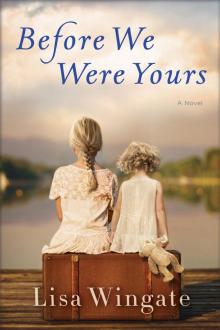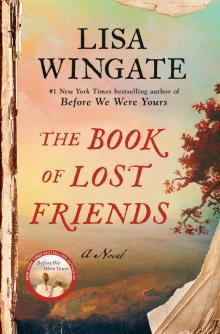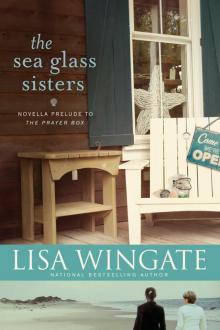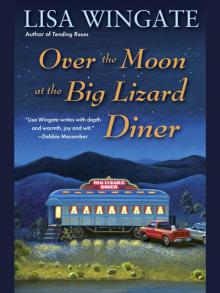- Home
- Lisa Wingate
Firefly Island Page 17
Firefly Island Read online
Page 17
I called the lab again, got the answering machine. “Daniel, I need you. I can’t find Nick!” I slammed the phone into the cradle, paced the kitchen, trying to think. Should I get in the car and drive down to the lake, look for Nick there? What if he was still somewhere around the house? What if he came back, and I was gone? I needed help. I needed somebody. Who could I call? Al didn’t carry a cell phone, and she wouldn’t be in the house this time of the day. The sheriff’s department was miles away. Town was miles away. Did we have a phone book for the area?
“Stupid. Stupid.” This was my fault. I hadn’t even bothered to gather up emergency numbers and keep them by the phone.
I ran to the bedroom and dumped my purse out onto the bed, dug through the mess for the sticky note with Chrissy’s work number on the back. By the time she picked up the phone at the pharmacy, I was in tears on the other end. I blurted out the story between sobs and moans of regret. A voice in the back of my head admonished, See? See? What made you think you could be someone’s mother? Meanwhile, Chrissy repeated details to the pharmacist, her voice taking on a breathless sense of drama that heightened my fear and reinforced the idea that I wasn’t panicking over nothing.
Before Chrissy and the pharmacist could decide whether it would be better to relay information to the county sheriff’s department or round up some volunteers to search for Nick, a silver BMW convertible melted out of the heat waves on the driveway. The low undercarriage scraped the grassy hump in the center of the road, sending up a silty cloud of caliche dust that overtook the car. Wandering peafowl scattered in all directions as the incongruous vehicle whipped into a parking spot beside Jack’s ranch truck. Jack was in the passenger seat, the driver a distinguished-looking man in a suit. The two of them were engaged in what looked like a business conversation.
I dropped the phone and ran outside, throwing open the gate before they were out of the car. If I’d previously been intimidated by Jack West, in that moment I wouldn’t have cared if he were Attila the Hun. I wanted someone to help me find Nick. Alive and well and unharmed.
“Nick’s gone!” I blurted. “I can’t find him anywhere. I’ve checked the house and the yard, and … and I was in the kitchen … and then I realized I hadn’t heard him … and I don’t know how long …” The story tumbled out, almost unintelligible. I felt time ticking away, the possibility of this turning out to be an innocent, harmless incident growing thinner and thinner as the minutes passed.
Jack patted the air, his expression hard to read in the shadows of his cowboy hat, his voice matter-of-fact. “Kids wander off. Where’s the last place you saw the boy?”
I repeated the details again.
He turned to the man in the business suit, who was standing with his hands clasped, his face impassive, as if he were waiting for Jack to tell him what his reaction should be. “Jankowski, grab the radio in my truck, there, and see if any of the hands are around. Track down Daniel, too. Could be he came by and picked up the boy and didn’t check in.”
“Daniel would never do that,” I insisted. “He always lets me know if he’s taking Nick. We always tell each other. He wouldn’t …” I stopped midsentence. Jack was already walking away. I followed along as the man in the suit, Jankowski, crossed to Jack’s truck.
“Yard gates weren’t open?” Jack seemed strangely detached from the situation—as if the outcome didn’t worry him in the least.
“No, they were all closed. Nick can’t open the latches, and there’s no way he could climb over the fence. But he’s not in the yard. I just don’t …”
Jack held up a hand, silencing me. He scanned the area, seeming to listen for something. A peacock strolled by, dragging a folded fan of tail feathers, and he watched it pass. “You seen the dog lately?” In the past month, Pecos had gone from my dog to the dog, in Jack’s vernacular. “Dog wouldn’t just leave the yard without the boy.”
Inside, I was screaming, Stop standing here talking! We have to do something! Jack started toward the yard, toward the one place I was certain Nick wasn’t. “They’re not there. I looked. I searched everywhere.” My mind flashed a picture of Nick wandering into the surf. We didn’t have time to waste looking where I’d already searched.
“You check in the garage buildin’?”
“I said I’ve been everywhere. They’re not in the yard.”
Right now, Jack looked as though he didn’t care whether Nick lived or died. What kind of man was he?
“I can’t raise anyone on this thing,” Jankowski yelled, and even he seemed more concerned than Jack.
My stomach fell. The world spun. I felt like I was going to be sick. We needed help, and we needed it now. “We have to call the sheriff, or somebody, before any more time goes by.”
Jack held up a hand to silence me again. I wasn’t inclined to obey this time. I whirled toward him, intent on taking control of the situation.
“You check in the little house?” he asked.
“What … no, it’s … the doors are locked.” If Nick had somehow managed to let himself into Jack’s house, surely he would have heard me when I was running around the yard calling his name.
A slow heel turn swiveled Jack toward the gate, and he strode through, dismissing me in midsentence. Left with little other choice, I followed to the little house, again protesting the waste of time. His glance was dismissive as he took a skeleton key from the porch light and turned the old-fashioned lock. The door creaked open, and he paused to replace the key, his countenance still annoyingly calm.
A soft sound jingled in the silent air, barely audible. I listened again and heard nothing except the fall of Jack’s boots against the hollow floors, his passage quieted by seventies-vintage linoleum in an avocado-green print. The kitchen décor seemed to be of the same era, the wallpaper covered in sprays of tiny sunflowers. The L-shaped row of cabinets looked to be a deep shade of olive green, now gray with dust. A saucepan sat on the stove next to a china canister that read Oatmeal, and a dust-covered metal spoon struggled to reflect the weak afternoon light filtered through partially disintegrated lace curtains.
A child’s cereal bowl and mug waited on a cream-colored breakfast table by the window. The chair was pulled out slightly, as if someone had left to grab the milk from the refrigerator and forgotten to come back. Without wanting to, I slid my gaze over the breakfast set. Fruity Pebbles ran in multicolored letters along the rim. Nick’s favorite cereal.
Where was the boy who’d owned that bowl? Why would it have been left on the table if he’d gone to Mexico with his mother for a long-term trip? Why did it look more like someone had been here making his breakfast, and then suddenly disappeared?
What if Jack’s wife and her little boy had never gone to Mexico at all? What if they’d never left the ranch?
I turned and watched Jack moving through the room, emotionless, not looking left or right. Had something unthinkable happened here? Had he done something unthinkable … and then left this place as … as what? A shrine? A trophy? A strange act of denial?
Behind me, the other man, Jankowski, stopped in the doorway. I didn’t blame him. This tiny house was filled with the presence of the woman and child who had been here—Jack’s wife and her young son.
I wanted to turn and run out the door, but I couldn’t. If Nick was in here, I had to find him, but how could he possibly be? The back door was locked. The other doors were, too.
Jack stepped through a darkened passageway into another room. Taking a breath of mildew and stillness, I followed him into the shadows, then emerged in a tiny living room with two sofas, a console television, and various antique end tables. The shades were pulled over bay windows at the opposite end, casting pallor over everything.
A beautiful painting hung over the sofa—a little blond-haired boy squatting in the grass, picking flowers. Rain lilies, like the ones that had bloomed in our yard. A lump rose in my throat as I followed Jack through another doorway into a hall that was narrow by modern standards, the striped wal
lpaper making the walls seem to close in. Jack traversed the distance in three long strides and crossed through another doorway into a sunlit bedroom. He stopped just inside the door, and I stopped just outside it.
Moving a few inches closer, I studied the interior with both foreboding and fascination. It was a child’s room, a boy’s, the bed constructed of miniature wagon wheels, the dresser fronts decorated with wood-burned cattle brands, the toy box and the shelves beside the closet door stocked with tiny trucks and tractors from a mixture of eras—some even old enough that they might have belonged to Jack.
Clothes hung in the closet. T-shirts, jeans, a suede jacket with fringe. A boy’s clothes. There was a photo beside the closet door. A woman with long blond hair, kneeling by the lakeshore with a little boy, both of them smiling at the camera. Firefly Island lay behind them, across the water. I knew exactly where the picture had been taken. I’d been there not long ago with Chrissy and Tag.
My head swam. I reached for the doorframe, steadied myself, felt a wave of grief mixed with the rush of desperation and adrenaline inside me.
Jack motioned toward the floor. I pulled my gaze downward, unwillingly grazing over another picture frame on the corner of the desk. A smiling little face underneath a cowboy hat. He couldn’t have been much older than Nick then …
I glanced downward still, past the legs of the desk, across the round rag rug that covered the wooden floor, and then, near the footboard of the bed, I saw them—Nick and Pecos, sound asleep on the floor, surrounded by an assortment of toys.
They’d been in here … playing?
“Looks like that answers your question,” Jack said, and Pecos opened his eyes. He rolled upright and surveyed the room, seeming surprised and slightly embarrassed to find himself here. Noticing Jack, he ducked his head and tucked his ears.
“Must’ve climbed in through the doggy door on the side of the house.” Jack turned to leave the room, and for an instant, there was emotion on his face. Grief? Pain? Regret? I couldn’t tell. As quickly as it came, it was gone, but suddenly I understood that there was a reason he’d known to look inside the little house even though the doors were locked. Nick wasn’t the first child to come in that way.
“I’ll get him.” I moved past Jack, stubbed my toe against a little red tractor, and watched it skitter across the room. Nick had trespassed where he shouldn’t have, touched things that had been closeted away for years. “I’m sorry.” My voice choked with a mixture of feelings I couldn’t even begin to sort out. “I … I had no idea he could … get in here.” Threading through the toys, I tried to decide whether to pick them up or leave them. The photo of the little boy and his mother pulled at me again. I didn’t want to look. I didn’t want to touch anything. I just wanted to grab Nick, get him out of this place, explain to him why he should never come here again.
Jack didn’t answer, but walked back through the house without a word. I picked up Nick and followed, passing down the hall and across the living room, not looking at the painting above the sofa. The dog followed quietly behind me, as if even he knew we were treading on memorial ground.
Outside on the back steps, I finally caught a breath as Nick yawned, stretched, and blinked, slowly coming to life. Smacking his lips, he took in the yard, his face a mask of confusion as Jack locked the little house again and put the key away.
The sounds of a car door closing and another vehicle rumbling up the driveway echoed against the buildings as we walked back around the corner. When I stepped onto the path, Chrissy was hurrying toward the yard, her eyes wide, her red curls flying in the wind. “Oh my gosh, you found him!” Leaving the gate hanging, she ran to meet us. “Thank God! I’ve been callin’ everyone I could think of to come help you search.”
From the looks of things, she had. Two vehicles were racing up our driveway already, and a third had just turned in the gate. The posse had arrived.
Never go to bed mad. Stay up and fight.
—Phyllis Diller
(Left by Mama B, for the couple not talking in Cabin 3)
Chapter 13
The evening after Nick’s disappearance wasn’t a pretty one in our house. Daniel and I fought because while Nick was missing, Daniel had been AWOL—so consumed with trying to recalibrate a fixed-speed centrifuge that he’d turned off the phones in the lab.
My Firefly Island epiphany evaporated like smoke, and I heard myself hissing, “There’s something wrong here, Daniel, and you’re so caught up in your fascination with Jack West’s scientific genius that you’re blind to it. You didn’t see what I saw in that little house. It’s like a shrine, and then out in the garage, I found a cookbook. I think it was her cookbook. There was a letter in it she was writing. She talked about needing to get away from here, about being afraid. You have a family to think about, Daniel. Nick and I need you to put us first. It’s like Jack West is pulling you further and further away from us. I feel more like your hired nanny than your wife!” They were horrible words—the worst I could think of. In that moment, I meant them to be. I was going for shock value, hoping Daniel would wake up if I hit him hard enough.
For the first time we ended up not speaking, and we slept in separate places.
In the morning, Daniel was gone before daylight. I woke exhausted, aware that I’d been tossing all night, dreaming that Nick was wandering along the lakeshore alone, unaware that just across the cove, hidden in the dark undergrowth of Firefly Island, someone was stalking him. Someone dangerous.
A moment later, I was in a grocery store, but there were no customers. I was running from aisle to aisle, screaming for Nick. Then I saw him walking out the door hand-in-hand with the little boy from the photos in Jack’s cottage. I screamed, tried to run, but my legs wouldn’t work.
Frightening, vivid dreams came one after another, a relentless assault.
In the morning I went straight to Nick’s room to check on him. He was sleeping in after his big day afield, his fist curled close to his face, his blond curls spread out on the pillow, soft, angelic. His face was so peaceful, his lips playing with the smile from some dream that must have been very different from mine. He deserved so much more than two people who couldn’t seem to pull it all together.
In the kitchen, the pages had been turned in the red-and-white-checked cookbook, the letter tucked haphazardly in a different place than before. Daniel must have looked at it, then gone to work, not the least bit concerned.
I pulled it out, read those few sentences, realized again that they could have meant almost anything, could have been written by anyone… .
The phone rang, and Trudy was on the other end.
“Hey, everything okay?” She sounded at once both concerned and cheerful. “I woke up thinking about you this morning.” Trudy and I always had that sixth sense that connects sisters like an invisible thread. “I checked the blog, and The Frontier Woman didn’t report yesterday. Thought I’d make sure you hadn’t been carried off by coyotes.”
“Last night’s report wouldn’t have been pretty.” I passed through the kitchen, saw the peach pies, baked but untouched. “We had a major blow-up.” I spilled the story. “I woke this morning feeling awful—and not just about the fight. Just when I think I’m finally settled in … then, I’m not. Trudy, there’s either something wrong with this place or there’s something wrong with me.”
“Okay, let’s just back up a little.” Trudy was the voice of reason, as usual. “Not that the letter thing doesn’t give me the creeps a little. I can see how you could read almost anything into it, but it’s not like you to be so … reactionary.”
I sighed, wanting to pick up the pie-making utensils and smack myself repeatedly on the forehead. “I’m sure I’m being mental. Maybe I’m just tired. I’m having all these wild dreams—not just the bad ones I told you about. One night, I was helping with the cattle roundup, only I was riding a spotted cow. Anyway, every day seems like a roller-coaster ride. One minute I’m psyched about the blog or about working on the house wi
th Al, and then the next minute, I have this out-of-nowhere urge to crawl in a hole and cry my eyes out. It’s just weird.” I reached into the cabinet for a mug, thinking that some coffee would smooth away the rough edges. I didn’t want to greet Nick first thing in the morning in this kind of mood.
“Mal, are you two using birth control?”
I almost dropped the phone. “What?”
“You heard me.”
Outside, a peacock strutted by, its fan of tail feathers as otherworldly as Trudy’s question. I stared at the bird for a minute, grasping for an answer. “Where is that coming from? Of course we’re using birth control. The last thing we need right now is a pregnancy to worry about.” As soon as the words were out, I realized how wrong they were. On the other end of the line, my sister would have given anything for a pregnancy, for a baby. “I’m sorry, Trude. That sounded really bad. I should go before I say anything else stupid. Any news on the in vitro, by the way?”
“No bad news, which is good so far, but let’s not get off track. We’re talking about you. When Carol was pregnant, she was exactly like that. So were Meryl and Missy. The dreams, the wild emotions, the …”
“I’m on the pill, Trudy. Believe me, I take it regularly. Daniel and I haven’t even talked about whether we want more kids, and now definitely isn’t the time.” Our lives were so tenuous already; I couldn’t even imagine what a pregnancy might do.
Trudy was like a dog on a choice fillet. “What was that thing the week before the wedding … that day I called you, and you’d been to the doctor?”
“That was the dentist, and it was a root canal. What does that have to do with anything?”
“Oh, man …” Trudy’s response was laden with gravity, her hesitation weighty. “Did they prescribe antibiotics for that?”
“Yes, they did, and the first one gave me hives. I thought I was going to have to go to my wedding looking like Shrek, by the way.” It seemed funny now, but at the time, it felt more or less like a tragedy. Waking up with hives during your wedding countdown is tantamount to a bride’s worst nightmare. “Anyway, they called in a replacement, and it was fine. I finished them up on the honeymoon. No more problems with the tooth. Thank goodness, because I don’t know where the nearest dentist is around here. I’m going to have to look into that.”

 Before We Were Yours
Before We Were Yours A Sandy’s Seashell Shop Christmas
A Sandy’s Seashell Shop Christmas The Book of Lost Friends
The Book of Lost Friends Larkspur Cove
Larkspur Cove The Sea Glass Sisters
The Sea Glass Sisters The Language of Sycamores
The Language of Sycamores Dandelion Summer
Dandelion Summer Word Gets Around
Word Gets Around Beyond Summer
Beyond Summer Firefly Island
Firefly Island The Tidewater Sisters: Postlude to The Prayer Box
The Tidewater Sisters: Postlude to The Prayer Box Talk of the Town
Talk of the Town![Blue Sky Hill [01] A Month of Summer Read online](http://i1.bookreadfree.com/i1/03/29/blue_sky_hill_01_a_month_of_summer_preview.jpg) Blue Sky Hill [01] A Month of Summer
Blue Sky Hill [01] A Month of Summer A Thousand Voices
A Thousand Voices Over the Moon at the Big Lizard Diner
Over the Moon at the Big Lizard Diner Never Say Never
Never Say Never Good Hope Road
Good Hope Road The Summer Kitchen
The Summer Kitchen A Month of Summer
A Month of Summer Blue Moon Bay
Blue Moon Bay Drenched in Light
Drenched in Light The Sea Keeper's Daughters
The Sea Keeper's Daughters